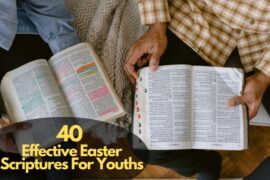Among the ancient scriptures that have stood the test of time, the Bible holds a special place. Rich in narratives, parables, and profound teachings, it offers insights into various aspects of human existence. Surprisingly, tucked within its pages, we can find reflections on the subject of boredom, revealing perspectives and guidance that can shed light on our contemporary struggles.
This article embarks on a journey through the Bible, exploring its passages, stories, and teachings to discover what it has to say about boredom. While the Bible may not explicitly use the term “boredom” as we do today, it touches upon themes and experiences that resonate deeply with our restlessness and dissatisfaction.
Contents
What Does The Bible Say About Boredom
Boredom can be defined as a state of being uninterested, unengaged, or lacking stimulation or satisfaction in one’s current activities or circumstances. It is often characterized by a feeling of restlessness, monotony, or a sense of time passing slowly. Boredom can manifest in various aspects of life, including work, relationships, hobbies, or even spiritual pursuits.
Importance of addressing boredom in daily life
Addressing boredom is crucial for maintaining overall well-being and leading a fulfilling life. When boredom takes hold, it can lead to negative consequences such as decreased productivity, lack of motivation, dissatisfaction, and even mental health issues like depression or anxiety. Moreover, persistent boredom can hinder personal growth, hinder relationships, and create a sense of purposelessness. Recognizing and understanding boredom is essential in order to actively seek meaningful experiences and find purpose in life.
Overview of the biblical perspective on boredom
The Bible offers guidance and wisdom on various aspects of human existence, including boredom. While the term “boredom” may not be explicitly mentioned in the Bible, the Scriptures provide insights into the human condition, the nature of God, and practical principles for addressing boredom and finding fulfillment. The biblical perspective on boredom emphasizes seeking fulfillment in God, cultivating contentment, stewarding our time and talents, engaging in meaningful activities, and fostering fellowship and community. By exploring these themes, individuals can gain a deeper understanding of how to navigate boredom in their daily lives and find purpose in their relationship with God and others.
Boredom as a Reflection of the Human Condition
God’s design for human beings as purposeful creatures
According to the Bible, God created human beings in His own image (Genesis 1:27). As part of His design, God instilled within each person a sense of purpose and the capacity for meaningful engagement with the world. God intended for humanity to experience fulfillment and satisfaction in fulfilling their God-given purpose. Therefore, boredom can be seen as a deviation from God’s intended design, highlighting the innate longing within human beings for purposeful and engaging lives.
The impact of sin and the fall on human experience, including boredom
The entrance of sin into the world through the disobedience of Adam and Eve (Genesis 3) had profound consequences for the human experience, including the presence of boredom. Sin disrupted the perfect harmony between God, humanity, and the created order. As a result, human existence became marked by toil, frustration, and a sense of emptiness (Genesis 3:17-19; Ecclesiastes 1:2-3). Boredom can be understood as a symptom of the brokenness brought about by sin, as it reflects a disconnection from God’s intended purpose and a longing for something more.
Biblical examples of individuals facing boredom or a lack of fulfillment
Throughout the Bible, there are instances where individuals experience boredom or a lack of fulfillment, highlighting the universality of this human struggle. For example:
1. King Solomon: In the book of Ecclesiastes, Solomon reflects on his pursuit of pleasure, wealth, and wisdom, only to find them empty and meaningless. He describes a sense of boredom and weariness, declaring, “All is vanity and a striving after wind” (Ecclesiastes 1:14).
2. Israelites in the wilderness: After being delivered from slavery in Egypt, the Israelites wandered in the wilderness for forty years. During this time, they faced various challenges and often grumbled about their circumstances, expressing a sense of dissatisfaction and boredom with their daily provisions (Numbers 11:4-6).
3. The prodigal son: In Jesus’ parable of the prodigal son (Luke 15:11-32), the younger son squanders his inheritance in a life of indulgence. However, he eventually finds himself in a state of despair and emptiness, longing to fill the void within him. This story illustrates the consequences of seeking fulfillment in worldly pursuits and the subsequent realization of their inherent emptiness.
These examples demonstrate that boredom and a lack of fulfillment are not uncommon experiences, even among those in biblical narratives. They serve as reminders that true satisfaction and purpose can only be found through a relationship with God and living in alignment with His purposes.
Seeking Fulfillment in God
God as the ultimate source of purpose and satisfaction
The Bible teaches that true fulfillment and purpose are found in a relationship with God. God is the Creator of all things and the sustainer of life. He knows the deepest longings of our hearts and offers fulfillment that surpasses temporary pleasures or worldly pursuits. Psalm 107:9 declares, “For he satisfies the longing soul, and the hungry soul he fills with good things.” Recognizing God as the ultimate source of purpose and satisfaction is crucial in overcoming boredom and finding lasting fulfillment.
Biblical passages emphasizing seeking God’s presence and finding joy in Him
The Bible repeatedly encourages believers to seek God’s presence and find joy in Him. Psalm 16:11 says, “You make known to me the path of life; in your presence, there is fullness of joy; at your right hand are pleasures forevermore.” Additionally, Psalm 37:4 states, “Delight yourself in the Lord, and he will give you the desires of your heart.” These passages highlight the significance of prioritizing our relationship with God and finding delight, contentment, and joy in His presence.
Understanding the importance of a personal relationship with God in overcoming boredom
Developing a personal relationship with God is instrumental in overcoming boredom. Through this relationship, we experience God’s love, guidance, and purpose in our lives. Having a vibrant connection with Him allows us to find meaning and fulfillment even in mundane or challenging circumstances. It opens doors for God to reveal His plans and purposes for our lives, bringing a sense of significance and excitement. By cultivating a deep and personal relationship with God, we invite Him into every aspect of our lives, including addressing our boredom and infusing it with purpose and meaning.
By seeking God’s presence, finding joy in Him, and nurturing a personal relationship with Him, we can transcend the limitations of boredom. Our relationship with God becomes a wellspring of inspiration, purpose, and fulfillment, enabling us to embrace each day with anticipation and gratitude. In God, we discover that true satisfaction and lasting fulfillment are not dependent on external circumstances but are found in the richness of our relationship with Him.
Diligence and Stewardship
Biblical teachings on the value of hard work and diligence
The Bible emphasizes the value of hard work and diligence in various passages. Proverbs 10:4 states, “A slack hand causes poverty, but the hand of the diligent makes rich.” Additionally, Proverbs 12:24 encourages diligence, saying, “The hand of the diligent will rule, while the slothful will be put to forced labor.” These verses highlight the importance of actively engaging in our responsibilities and endeavors, demonstrating a diligent and industrious attitude. Diligence not only brings practical benefits but also contributes to a sense of purpose and fulfillment.
Recognizing and utilizing the talents and resources God has given us
God has endowed each person with unique talents, abilities, and resources. The Bible teaches that we are stewards of these gifts and should utilize them for God’s purposes. In the parable of the talents (Matthew 25:14-30), Jesus teaches about the importance of faithfully using the resources entrusted to us. By recognizing and developing our God-given talents, we can find purpose and fulfillment in using them to serve others and honor God. Whether it is through our skills, knowledge, time, or material resources, being good stewards of what God has given us allows us to combat boredom by actively engaging in meaningful activities.
Finding purpose and fulfillment in fulfilling our responsibilities and serving others
The Bible emphasizes the importance of fulfilling our responsibilities and serving others as a means of finding purpose and fulfillment. Colossians 3:23-24 says, “Whatever you do, work heartily, as for the Lord and not for men, knowing that from the Lord you will receive the inheritance as your reward.” By approaching our responsibilities, whether in our work, relationships, or other areas of life, with a mindset of serving God and others, we can find meaning and purpose. Engaging in acts of service, helping those in need, and making a positive impact in the lives of others not only combat boredom but also bring a deep sense of fulfillment and satisfaction.
By embracing diligence, recognizing and utilizing our God-given talents and resources, and fulfilling our responsibilities with a heart of service, we can find purpose and fulfillment. These actions not only combat boredom but also align us with God’s purposes and bring joy to our lives. As we diligently steward what God has entrusted to us and serve others, we discover that true fulfillment is found in selfless acts of love and living out God’s calling in our lives.
Contentment and Gratitude
Biblical teachings on contentment and gratitude in all circumstances
The Bible teaches the importance of contentment and gratitude in all circumstances. Philippians 4:11-12 says, “I have learned in whatever situation I am to be content. I know how to be brought low, and I know how to abound. In any and every circumstance, I have learned the secret of facing plenty and hunger, abundance and need.” These verses highlight the apostle Paul’s understanding of finding contentment in God regardless of external circumstances. Additionally, 1 Thessalonians 5:18 encourages believers to “give thanks in all circumstances; for this is the will of God in Christ Jesus for you.” Cultivating a spirit of contentment and gratitude helps combat boredom by shifting our focus from what is lacking to the blessings and provisions we already have.
Avoiding a consumerist mindset that contributes to boredom
The Bible warns against a consumerist mindset that seeks fulfillment in material possessions or worldly pursuits. Jesus cautions against the love of money and material wealth, stating that true life does not consist in the abundance of possessions (Luke 12:15). This mindset can contribute to boredom as it perpetuates a cycle of constantly seeking new and external sources of satisfaction. By recognizing the limitations of materialism and the temporary nature of worldly pleasures, we can avoid falling into the trap of constantly seeking new and superficial forms of fulfillment.
Practicing gratitude and finding joy in the blessings of life
Practicing gratitude is a powerful antidote to boredom. The Bible encourages believers to give thanks to God for His blessings and to find joy in the goodness of life. Psalm 100:4 declares, “Enter his gates with thanksgiving, and his courts with praise! Give thanks to him; bless his name!” By cultivating a habit of gratitude, we develop a mindset of appreciation for the simple joys and blessings that surround us. Gratitude shifts our perspective and allows us to find joy and fulfillment in the present moment, combating feelings of restlessness or dissatisfaction.
By embracing contentment, avoiding a consumerist mindset, and practicing gratitude, we can counteract boredom and find joy in the blessings of life. Contentment frees us from the constant pursuit of novelty and helps us appreciate what we already have. Gratitude opens our eyes to the goodness around us and fills our hearts with a sense of appreciation and joy. Through these practices, we can find contentment and fulfillment in the present, combatting boredom by embracing a mindset of gratitude and appreciation for the abundant blessings of life.
Engaging in Meaningful Activities
Exploring the Bible’s encouragement to pursue meaningful activities
The Bible encourages believers to pursue meaningful activities that align with God’s purposes. Ephesians 2:10 states, “For we are his workmanship, created in Christ Jesus for good works, which God prepared beforehand, that we should walk in them.” God has uniquely designed and equipped each person with specific gifts, talents, and passions. By exploring and engaging in activities that reflect our God-given abilities and passions, we can experience a sense of purpose and fulfillment. The Bible also encourages believers to seek wisdom and knowledge, as Proverbs 18:15 says, “An intelligent heart acquires knowledge, and the ear of the wise seeks knowledge.” Engaging in activities that expand our understanding, develop our skills, and contribute to personal growth can combat boredom and lead to a more fulfilling life.
Using our time and talents for God’s purposes
The Bible teaches that our time and talents are to be used for God’s purposes and the benefit of others. 1 Peter 4:10-11 exhorts believers, “As each has received a gift, use it to serve one another, as good stewards of God’s varied grace…in order that in everything God may be glorified through Jesus Christ.” By using our time and talents in service to God and others, we find fulfillment and purpose. This may involve serving in our local church, volunteering in the community, or using our skills to help those in need. When we use our time and talents for God’s purposes, we experience the joy of making a difference and contributing to something greater than ourselves.
Engaging in acts of service, creativity, and learning to combat boredom
Engaging in acts of service, creativity, and continuous learning are effective ways to combat boredom. Acts of service allow us to focus on the needs of others, providing a sense of purpose and fulfillment. Jesus taught the importance of serving others, saying, “For even the Son of Man came not to be served but to serve, and to give his life as a ransom for many” (Mark 10:45). Creativity, whether through art, music, writing, or other forms of expression, enables us to channel our emotions, ideas, and talents, providing a meaningful outlet. Finally, continuous learning and personal growth expand our horizons, stimulate our minds, and open doors to new opportunities. Proverbs 18:15 says, “The heart of the discerning acquires knowledge, for the ears of the wise seek it out.”
By engaging in meaningful activities such as acts of service, creativity, and continuous learning, we can combat boredom and find purpose and fulfillment. These activities allow us to use our time and talents for God’s purposes, contribute to the well-being of others, and explore our passions and interests. Through these pursuits, we discover that life is a journey of growth, discovery, and meaningful engagement, filled with opportunities to make a positive impact in the world around us.
Fellowship and Community
The importance of fellowship and community in the Christian life
The Bible places a strong emphasis on fellowship and community in the Christian life. Hebrews 10:24-25 encourages believers to “consider how to stir up one another to love and good works, not neglecting to meet together, as is the habit of some, but encouraging one another.” Christian fellowship provides a supportive environment where believers can grow spiritually, find encouragement, and experience accountability. It is through fellowship and community that we can share our joys, sorrows, and struggles, and support one another in our journey of faith. Being part of a community of believers helps combat boredom by fostering meaningful connections and providing opportunities for shared experiences.
Building meaningful relationships and participating in Christian community
Building meaningful relationships and actively participating in Christian community is crucial for combating boredom and finding fulfillment. This involves seeking out and investing in authentic relationships with other believers. Acts 2:42-47 provides a beautiful picture of the early Christian community, where believers devoted themselves to fellowship, breaking bread together, and praying together. Engaging in small groups, Bible studies, church activities, and other forms of community involvement allows for deeper connections and the opportunity to grow alongside fellow believers. By participating in Christian community, we can find companionship, accountability, and mutual support, fostering a sense of purpose and belonging.
Finding fulfillment and purpose in serving and supporting others
A key aspect of Christian fellowship and community is the call to serve and support one another. Galatians 5:13 says, “Through love, serve one another.” Serving others allows us to combat self-centeredness and boredom by focusing on the needs of others. By using our gifts, talents, and resources to bless and support those around us, we find fulfillment and purpose. Acts of service within the Christian community and the broader world enable us to make a positive impact and share the love of Christ. Additionally, supporting others through prayer, encouragement, and practical assistance creates a culture of care and compassion within the Christian community, fostering a sense of purpose and fulfillment for both the giver and the recipient.
By embracing fellowship and community, building meaningful relationships, and actively participating in the life of the Christian community, we can combat boredom and find fulfillment in serving and supporting others. Christian fellowship provides a space for authentic connections, mutual encouragement, and accountability. Engaging in acts of service and supporting others allows us to participate in God’s work, fostering a sense of purpose and fulfillment. Through fellowship and community, we experience the beauty of shared faith and the power of unity as we journey together towards spiritual growth and the fulfillment of God’s purposes.
Conclusion
In this exploration of what the Bible says about boredom, several key points have been highlighted. We discussed the human condition and how sin and the fall impact our experience, including the presence of boredom. We learned about seeking fulfillment in God, recognizing Him as the ultimate source of purpose and satisfaction. The importance of diligence and stewardship, contentment and gratitude, engaging in meaningful activities, and fellowship and community were also emphasized as biblical principles to combat boredom and find fulfillment.
As we navigate the challenges of boredom in our daily lives, it is essential to apply the principles we have discussed. We are encouraged to seek God’s presence, develop a personal relationship with Him, and find joy in His provision. We should embrace diligence, recognizing and utilizing our talents and resources for God’s purposes. Cultivating contentment and gratitude enables us to appreciate the blessings in our lives, while engaging in meaningful activities, acts of service, and participating in Christian community helps combat boredom and fosters a sense of purpose and fulfillment.
Ultimately, aligning our lives with God’s design and purpose has the power to transform our experience of boredom. By recognizing our inherent purpose as His creation, seeking fulfillment in Him, and living according to His principles, we find meaning and purpose in every aspect of our lives. Embracing God’s design allows us to overcome boredom by infusing our daily activities with purpose, finding joy in serving others, and discovering fulfillment in our relationship with Him.








